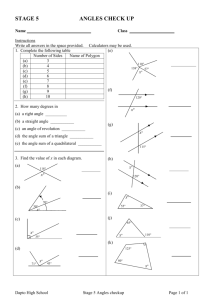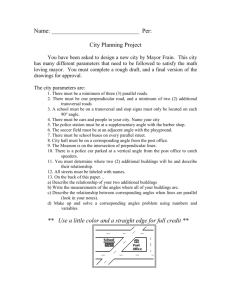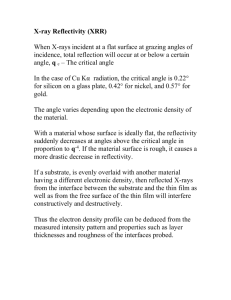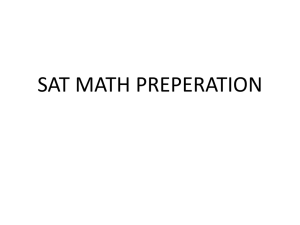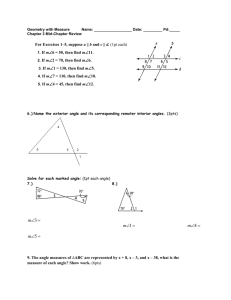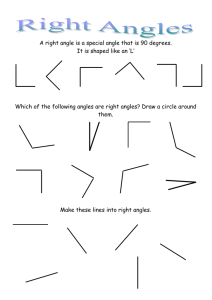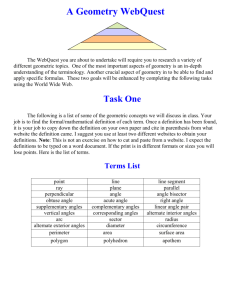Lesson Plan 1A
advertisement
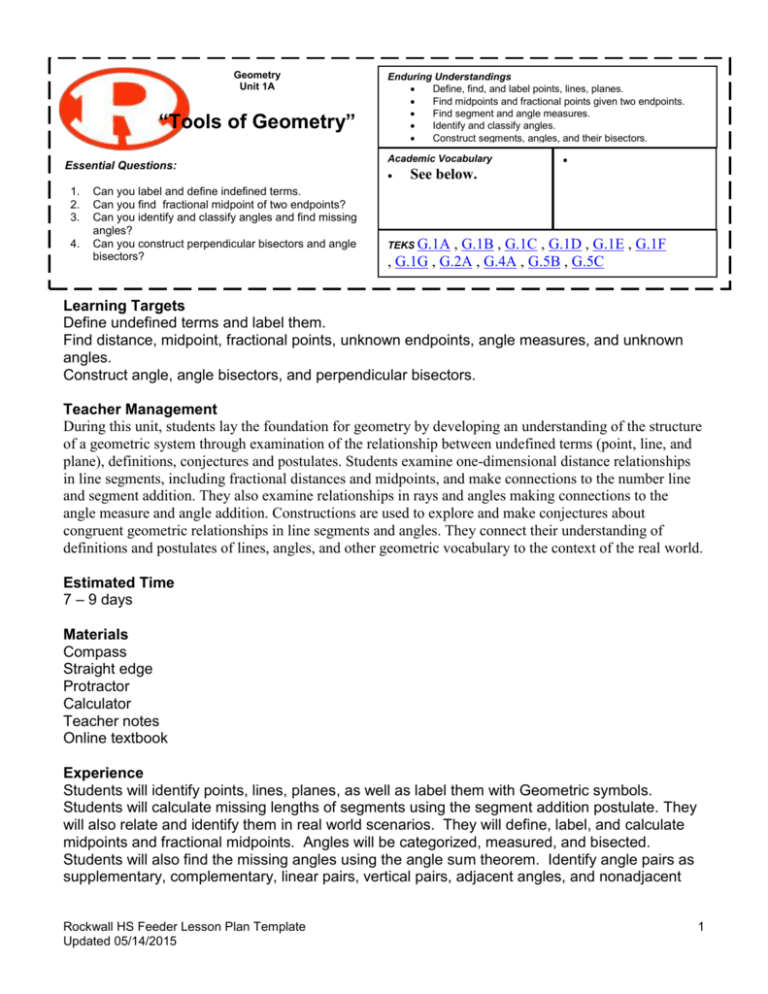
Geometry Unit 1A “Tools of Geometry” Essential Questions: 1. 2. 3. 4. Can you label and define indefined terms. Can you find fractional midpoint of two endpoints? Can you identify and classify angles and find missing angles? Can you construct perpendicular bisectors and angle bisectors? Enduring Understandings Define, find, and label points, lines, planes. Find midpoints and fractional points given two endpoints. Find segment and angle measures. Identify and classify angles. Construct segments, angles, and their bisectors. Academic Vocabulary See below. TEKS G.1A , G.1B , G.1C , G.1D , G.1E , G.1F , G.1G , G.2A , G.4A , G.5B , G.5C Learning Targets Define undefined terms and label them. Find distance, midpoint, fractional points, unknown endpoints, angle measures, and unknown angles. Construct angle, angle bisectors, and perpendicular bisectors. Teacher Management During this unit, students lay the foundation for geometry by developing an understanding of the structure of a geometric system through examination of the relationship between undefined terms (point, line, and plane), definitions, conjectures and postulates. Students examine one-dimensional distance relationships in line segments, including fractional distances and midpoints, and make connections to the number line and segment addition. They also examine relationships in rays and angles making connections to the angle measure and angle addition. Constructions are used to explore and make conjectures about congruent geometric relationships in line segments and angles. They connect their understanding of definitions and postulates of lines, angles, and other geometric vocabulary to the context of the real world. Estimated Time 7 – 9 days Materials Compass Straight edge Protractor Calculator Teacher notes Online textbook Experience Students will identify points, lines, planes, as well as label them with Geometric symbols. Students will calculate missing lengths of segments using the segment addition postulate. They will also relate and identify them in real world scenarios. They will define, label, and calculate midpoints and fractional midpoints. Angles will be categorized, measured, and bisected. Students will also find the missing angles using the angle sum theorem. Identify angle pairs as supplementary, complementary, linear pairs, vertical pairs, adjacent angles, and nonadjacent Rockwall HS Feeder Lesson Plan Template Updated 05/14/2015 1 pairs. Students will also construct perpendicular bisectors and angle bisectors with a compass and straight edge only. Literacy Strategies Students will write a “how to” list of instructions describing to someone how to construct the perpendicular bisector. Synthesis Students will be angle to construct perpendicular bisectors and angle bisectors. Students will meet and exceed expectations on quizzes and tests. Teacher Note Some students may think a conditional statement and its converse are logically equivalent, rather than testing to determine their truth value. Differentiation Students will complete Challenge Problems to demonstrate expansion of the basic lesson. Vocabulary: Line Segment – part of a line between two points on the line, called endpoints of the segment Midpoint of a Line Segment – the point halfway between the endpoints of a line segment One-Dimensional Coordinate System – numbers used as locations of points on a number line Postulates (Axioms) – true statements not requiring proof Undefined Terms – terms not formally defined and used to define other terms/concepts in a mathematical system Related Vocabulary: Acute angle Adjacent angles Angle Angle addition Angle mesasure “Betweenness” Collinear Compass Complementary angles Coplanar Defined terms Degree measure Rockwall HS Feeder Lesson Plan Template Updated 05/14/2015 Distance Exterior of an angle Interior of an angle Intersection Length Line Linear pair of angles Non-collinear Non-coplanar Number line Obtuse angle Point Postulate Ray Right angle Segment addi Space Straight angle Straight edge Supplementar Vertex Vertical angle 2
